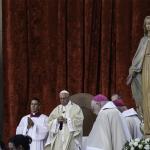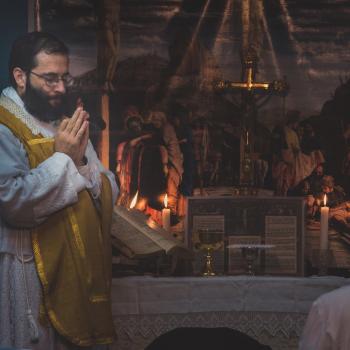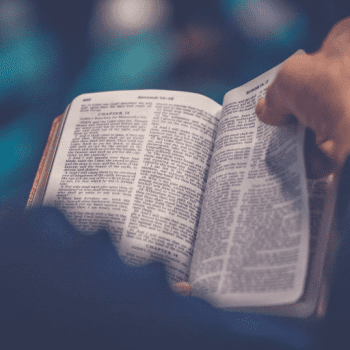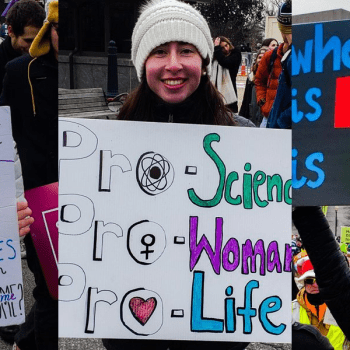Fr. Virgil Bradley Tetherow was forbidden from saying Mass and removed from the clerical state. However, he was recently celebrating Mass in public, at a rogue chapel disconnected from the Catholic Church. This story obviously has some unpleasant details: I present them because I think the story shows us some lessons, not to be salacious. The last section will give three lessons: but between here and there, I tell the story. (You can skip right to that section if you prefer.) So, what lessons does this story teach us? This story teaches us the improvements the Church has made, the limits on any punishment, and the need for vigilance.
Ordained then Defrocked
The York Daily Record carried this history in their report. I will skip most to give important points.
“I had everything in the world — nice clothes, fancy cars, and a gorgeous place to live but I didn’t have peace,” Tetherow said in the magazine article, adding that he was once Mr. Oregon. […]
Tetherow was ordained at Our Lady of Guadalupe in Denton, Nebraska, on June 29, 2002.
He was incardinated in the Diocese of Scranton but never given an assignment, according to the grand jury report. […]
On Jan. 17, 2005, the Rev. Michael Kloton, the priest from St. Ann’s, went to Pocono Mountain Regional police to file a report.
According to police records, Kloton brought a 14-page list of computer data and a disc with images of “immoral material” that had been found on a church computer. […]
On Aug. 16, 2005, Tetherow pleaded guilty to criminal use of a communication facility, a felony, and was later sentenced to serve two years of probation. Prosecutors moved to dismiss the remaining charges, including 10 counts of possession of child pornography.
In a written form, Tetherow signed his name acknowledging that he understood all the elements of the crime to which he was pleading guilty.
Later, the Vatican laicized him after a lengthy process where Tetherow’s lawyer argued that he didn’t know he was confessing to child pornography and that according to psychosexual evaluation he seemed pretty normal.
The diocesan spokesman summarized the current situation:
Tetherow “is not recognized as a priest, is prohibited from presenting himself as clergy and is not associated with the Diocese of Harrisburg,” said Mike Barley, a spokesman for the diocese, who encouraged the faithful to not attend Tetherow’s services.
Celebrating Public Mass
The York Daily Record also included details of Tetherow celebrating Latin Mass in a breakaway chapel against the bishop’s orders.
On July 17, 2011, St. Michael the Archangel Roman Catholic Church held its first traditional Mass. [Note: this chapel is not Roman Catholic despite its claims. It is a rogue chapel not under any legitimate bishop and thus in schism.]
In the book [Rebirth of a Chapel], Romeo wrote that the first words he heard Tetherow say from the pulpit were, “I am at odds with my bishop.”
Tetherow made it clear that he would not offer the new Mass so he became a “persona non grata” with his bishop and diocese. The decision, the book states, “would lead to years of personal assaults one would never wish on anybody.” […]
St. Michael the Archangel Roman Catholic Church [See above: it isn’t Catholic] is part of the Guild of St. Peter ad Vincula, a loose affiliation of independent priests based in Ohio, providing support to traditional Catholics, said Father Bernard Hall, dean of the guild.
The guild, he said, has no authority over the priests or churches that are part of it.
He said he’s “been aware of accusations made against” Tetherow for many years but was led to believe it was a set-up because he’s a traditional priest and could be targeted.
Checking the Details of His Guild
I wanted to check a few of the details of this, so I did some Googlefu.
The guild which Tetherow is part of has three main requirements for membership.
- Valid orders
- Solid religious formation
- History of good morals
I don’t know how you can square that away with the leader’s admission above that he was aware of accusations against Tetherow. The reporter for the York Daily Record added some details to those admissions which Hall, the dean, had not known previously. However, some action seems to have been taken since the article was published – possibly Hall suspended Tetherow – as Tetherow’s name was scrubbed from the guild’s and the chapel’s websites. Interestingly, the guild lists a chaplain for every chapel on their website, except the two chapels in Pennsylvania where Tetherow celebrated Mass. The chapels also have a Facebook page that displays pictures of the extraordinary form of the Mass. They seemed to have scraped Tetherow’s name from the posts themselves but comments still indicate that the celebrant is Tetherow.
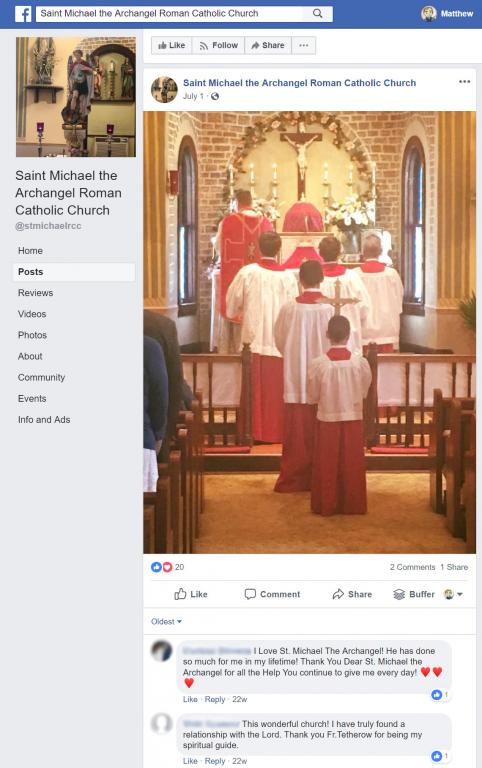
What brought this situation to head is that Tetherow’s crime is mentioned in the large Pennsylvania Grand Jury Report.
Fr. Relyea Renounces Tetherow
Fr. Isaac Mary Relyea, a priest who was with Tetherow earlier trying to start a community, wrote a blog post in 2015 detailing the problems with Tetherow and renouncing him. Three are notable.
First, Tetherow convinced the judge to have him serve his criminal sentence at a monastery. Tetherow promised that the only monk, Fr. Angelus Ferrara, would supervise him. Fr. Relyea continues, “Not long after Tetherow completed his sentence, his friend and mentor, Fr. (Angelus) Ferrara, was arrested and charged for the homosexual abuse of a teenage boy, convicted, and sentenced to prison in Pennsylvania.”
Second, Fr. Relyea explains is Tetherow’s attempts to avoid laicization. He writes “It was Tetherow’s friend, Fr. (Angelus) Ferrara, who wrote the letter of recommendation to Rome in support of Tetherow who was trying to canonically contest the process of laicization.” Fr. Relyea goes on about his sophistical argument against laicization but the main point is that Tetherow fought strongly, but self-servingly, against laicization.
Finally, Fr. Relyea mentions Tetherow’s habitual lying. He states, “I have personally caught Tetherow telling more lies than I can count or care to remember. Even now, after more than five years of seeing this man, conversations with others uncover lies that he told.” The York Daily Record confirms this characterization in noting that Tetherow would claim to have portrayed Tigger, but Disney denies that.
Lessons from this Messy Case
There are a few side lessons here but I want to focus on three: the good news of how the Church reacted, the limited power of the Church, and our own vigilance.
The Dallas Charter Works
In many ways, this is a model case for showing the reform of the Church. A technician found child porn on a Church computer and immediately the priest in charge gave the evidence to the police. The other priest, Fr. Michael Kloton, cooperated fully. Tetherow was suspended from ministry – as far as I could see, immediately – and later laicized. This shows that after the 2002 reforms, the Church dealt with this well. This should give us hope.
Limits on the Church’s Power
However, the Church can’t do everything. After ordination as a priest, a man is always a priest. Theologically, there is no way to un-ordain him. A priest can validly say Mass from ordination to his death. Laicization includes ordering Tetherow not to say Mass, but from ordination, every priest has an irrevocable power to do so.
After we’ve already forbidden a priest from saying Mass and removed him from being a cleric, there is not much else the Church can do. Any public Mass Tetherow says now is illicit, and it is grave matter for him to celebrate Mass against such orders (i.e. assuming he has full knowledge and deliberate consent, each Mass he celebrates publicly is a mortal sin). You can note above that the diocese has done their best to inform people and discourage them from going to Tetherow’s Masses.
In this case, if no new accusation comes about, there isn’t much the state can do either as pleading to a lesser crime means he avoided registering as a sex offender.
We Need Vigilance
Finally, we need to continue the vigilance that the current child protection guidelines tend to instill into us who work for the Church. We need to realize someone can seem nice but have serious underlying issues. One person is quoted in the York Daily Record expressing his love for Tetherow, “I have never met a priest that I’ve felt more comfortable within his religiosity and his ability to teach the religion of the Roman Catholic faith.” I can think of at least two priests I’ve known who seemed nice but were later accused, one of whom is in the laicization process. Fortunately, all the great strides the Church has made in child protection are there to help us if we ever overwhelmed or uncertain.
The world isn’t perfect. Unfortunately, this means we can’t always have perfect solutions to problems. However, nonetheless, we should learn lessons from the imperfect situations like that of Tetherow.
Update
I did a follow-up piece when Fr. Tetherow returned.

